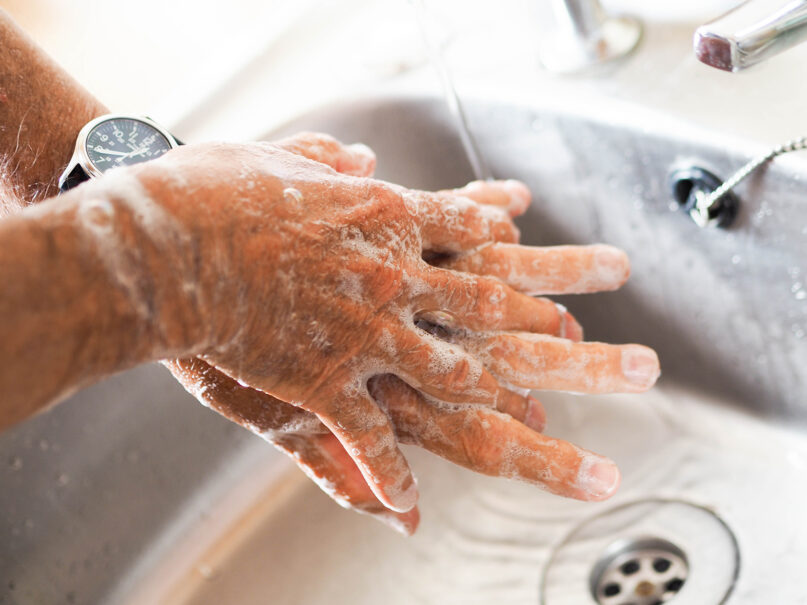(RNS) — Cleanliness is said to be adjacent to godliness, but on Yom Kippur, the Jewish calendar’s most sacred day, many Jews adhere to centuries-old rabbinic mandates curbing hand-washing.
The proscription interprets biblical mandates, articulated multiple times in Leviticus and Numbers, to “afflict yourselves” on the climactic final day of the High Holy Days. This year, Yom Kippur begins Wednesday evening (Sept. 15).
“Typical activities that bring physical comfort, pleasure or luxury were prohibited by the early rabbis to help us achieve the Torah’s directive of ‘afflicting ourselves’ as part of the process toward the atonement Yom Kippur provides,” said Rabbi Aaron Alexander of Adas Israel, Washington, D.C.’s largest Conservative synagogue.
During a pandemic, the rule butts up against public health advice. Some rabbis are telling congregants to come clean despite the commandment, while others say no soap to that kind of leniency.
Last year, Alexander offered guidance on the matter that was published on the website of the Rabbinical Assembly, the 120-year-old international Conservative rabbi association. “Washing/sanitizing hands is not only permitted, but required in most circumstances,” he wrote. He told Religion News Service he stands by that advice this year too.
“What is preferred is what works best based on medical advice,” he said.
Hand-washing is one of five prohibited categories of “affliction” the rabbis understood to operate on Yom Kippur, including eating and drinking, wearing comfortable (leather) shoes, rubbing oils on one’s skin and engaging in sexual relations, said Rabbi Avraham Bronstein, of the Hampton Synagogue (Orthodox) in Westhampton Beach, New York.
Many Orthodox Jews ritually wash only their fingers or parts of their hands upon waking up on Yom Kippur morning, according to Bronstein. He notes one may clean one’s hands, even with oil-based soap, if they become dirty, particularly after using the bathroom.
“It is clear that such washing is not for pleasure, but rather to remove the dirt,” he said.
Last Yom Kippur, Bronstein’s synagogue required congregants to wash and sanitize their hands when entering the campus, upon the recommendation of its medical advisory committee. This Yom Kippur, worshippers must prove they are vaccinated to attend in person.
“The hand-washing requirement is no longer in force,” Bronstein said. “In general, one should follow the recommendations of public health officials and medical experts, who can provide guidance for avoiding the spread of coronavirus.”
Eating and drinking on Yom Kippur are biblical prohibitions, while many Jews consider hand-washing a rabbinic injunction. That means it’s still important, but there is potentially more room for leniency in a pinch than with eating and drinking, which are only allowed in emergency situations, such as life-or-death ones.
During a public health emergency, the principle of pikuach nefesh — saving lives — overrides all ritual observance, including the Yom Kippur prohibition on hand-washing, according to Bronstein and Alexander.

Dana Herseovici stands with her son Tomas during an outdoor Yom Kippur service hosted by the Aventura Turnberry Jewish Center during the coronavirus pandemic, Sept. 28, 2020, at the Dezerland Park drive-in theater in North Miami, Florida. (AP Photo/Lynne Sladky)
But others, such as Shaul Magid, professor of Jewish studies at Dartmouth College and a rabbi, disagree. “I personally do not think COVID is a case of pikuach nefesh but more likely sakanah, which would allow certain things but not almost everything like pikuach nefesh.” (The Hebrew word sakanah means danger, but in this case, not life-or-death.)
Rabbi Menachem Posner, the Chicago-based staff editor of Chabad.org and a responder of more than 15 years to Chabad-Lubavitch’s ask-the-rabbi service, said pikuach nefesh isn’t relevant to this discussion.
“Washing for cleanliness was never forbidden to begin with,” he said. “Do whatever you did the day before Yom Kippur. Keep the same hygiene habits as before.”
“We don’t play games with health,” said Rabbi Yaakov Taubes, of Mount Sinai Jewish Center (Orthodox) in Manhattan and assistant programming director at Yeshiva University’s Rabbi Isaac Elchanan Theological Seminary.
“Afflicting” oneself by refraining from hand-washing on Yom Kippur relates to two things. It reflects the “separateness” of the day. “The purpose is not the pain. It is a way of making the day different,” Taubes said.
And there is a notion on Yom Kippur of being like angels, which lack earthly needs. “Angels are more spiritual beings,” said Taubes. “On this day, we are trying to be more complete spiritual beings and leave behind our more physical elements.”
There are even differences of opinion, Taubes noted, on how much of one’s hand one may wash on Yom Kippur: the metacarpophalangeal joint where fingers meet the rest of the hand, or the knuckle midway on the finger. “There are questions about what part of the knuckle,” he said.
Were the uncleanliness of one’s hands to interfere with one’s ability to pray, Taubes said, washing would be allowed on Yom Kippur. But absent a life-threatening reason, one should not wash one’s entire body. He also thinks sanitizing hands, as a waterless process, doesn’t qualify as rabbinic hand-washing.
“No one puts hand sanitizer on for enjoyment,” he said, even if there is a scent added.
Despite widespread vaccination, Taubes thinks Yom Kippur-observant Jews ought to follow their normal, non-High Holy Day hand-washing routines this year. That’s even true of those observing the holiday from home without interacting with others in synagogue or elsewhere.
During a cholera epidemic in 1848, renowned Rabbi Israel Salanter, founder of the devout, ethical Mussar movement, was said to have recited the ritual blessing on wine — kiddush — and eaten in synagogue on Yom Kippur to demonstrate to Vilna congregants how important it was to eat for medical reasons.
“I am almost certain that story has been verified,” Taubes said.
But many other observant Jews see hand-washing this year in a very different light and aren’t willing to throw in the towel on the prohibition.
A rabbi who is involved in the Jewish community in Lakewood, New Jersey — a center of the U.S. Orthodox population — says that most Orthodox Jews in Lakewood will be washing their hands this Yom Kippur at similar rates to what they did on the High Holy Day pre-COVID-19. He asked to remain anonymous, citing threats, abuse and harassment he and colleagues have faced in the past when talking publicly about communal responses to the pandemic.
“The general view is that COVID is a serious illness, but it can be dealt with responsibly without turning over the world and all of life as we know it,” the rabbi said.
With natural and vaccine immunity and early antibody treatment lowering hospitalization and death rates below a baseline, the rabbi said, “It’s because of this that we would not be meykel (lenient) so much on this, since even rechitzah sheayna shel taanug (washing that isn’t pleasurable) is still forbidden. It’s just not the same bad as if it were for enjoyment.”
For Jews who do plan to wash early and often on Yom Kippur, the question looms for future High Holy Days, when the pandemic and the virus are hopefully in the rearview mirror. What will be the status of hand-washing then? Many may find pandemic cleanliness habits are hard to shake, or that it is easy to worry about looming pandemics on the horizon.
In that instance, Bronstein, the Hampton rabbi, recommends that worshippers contact rabbis or medical professionals for guidance on individual anxieties.
“It is an interesting question, because keeping one’s hands clean to manage a fear of contagion is not the sort of pleasure the rabbis probably had in mind when they outlined their categories of physical pleasure and affliction,” he said. “On the other hand, if there is no real risk of spreading a virus, it seems difficult to permit even an anxious person to do something otherwise forbidden on Yom Kippur.
“After all,” he added, “‘affliction’ through deprivation is the point of the entire practice.”





